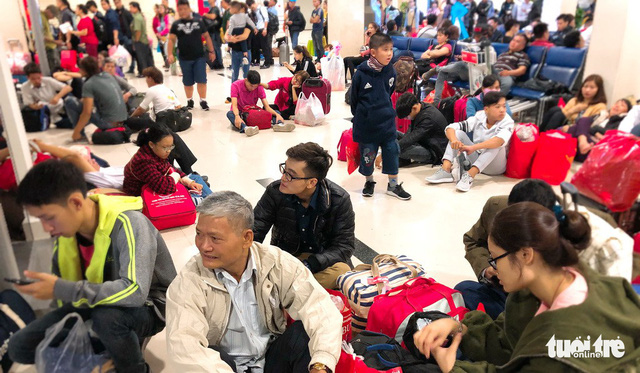The Civil Aviation Authority of Vietnam believes airlines should not be associated with such a negative term as ‘flight delay/cancelation’
Vietnam’s aviation authority has stipulated the use of a more generic term to talk about flight status, with service delay or cancelation now described as being ‘not-on-time.’
While the change of term has been criticized by members of the public and experts, the Civil Aviation Authority of Vietnam (CAAV) has said using the new jargon is a “suitable approach to catch up with international practices.”
The CAAV has stopped using “flight delay and cancellation” in its reports at least since the second quarter of 2017, with services now marked as either “on-time flights” or “not-on time flights,” a source with knowledge of the matter told Tuoi Tre (Youth) newspaper.
Vietnamese airlines, apparently backing the word change, now tend to inform passengers that their flights will “depart later than schedule due to late arrival of aircraft,” totally avoiding the word “delay.”
A CAAV representative told Tuoi Tre that the terms “flight delay” and “flight cancellation” are no longer in use by other countries’ aviation watchdogs.
“They now use the On-Time Performance (OTP) ratio to assess the results of a carrier,” he said.
OTP is one of the primary competitive parameters for international airlines around the world, so employing this for Vietnam will help the country stay in line with international practices, the official said.
A representative of a local airline shared this view, asserting that the “on-time performance” describes the status of a flight better than “delay and cancelation,” while giving passengers a lesser-negative impression about the carrier.
The ‘flight delay/cancellation’ term can be misleading for some passengers, who take it as meaning that the service is canceled, while it is only delayed, he explained.
“In the meantime, the term ‘not-on-time flight’ is more accurate, as it covers both cases - sooner and later than scheduled,” he added.
However, Nguyen Thien Tong, an aviation specialist, suggested that the CAAV should return to the old terms, condemning that such a shift in word use only illustrates unprofessionalism and dishonesty.
“The new term is only meant to make the poor performance of airlines sound less serious to passengers,” he said.























































